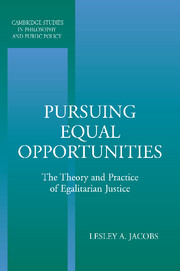7 - Universal Access to Health Care
Published online by Cambridge University Press: 05 June 2012
Summary
INTRODUCTION
So far in this book, I have been concerned to show the dynamic possibilities of the three-dimensional model of equal opportunities as a regulative ideal with regard to a range of issues in law and social policy. I now intend to illustrate the limits of that theory of equality of opportunity. Specifically, I have insisted that equality of opportunity is an egalitarian ideal applicable only when there should be a competition for resources. It follows that that concept is silent in cases where competition for resources is inappropriate. It is my view that many proponents of equality of opportunity have failed to appreciate its boundaries. And they have weakened the case for equality of opportunity by trying to utilize it everywhere in law and social policy. This chapter sets out a principled basis for limiting the application of equality of opportunity. The example I shall use to illustrate the limitations of equal opportunities as a regulative ideal is health care. After making a case for why competition for health care is counter-intuitive as evidenced by the widespread commitment to universal access, I point out the pitfalls of egalitarian efforts to ground universal access to health care when they assume either an equality of opportunity approach or some other approach that emphasizes competition.
THE SIGNIFICANCE OF UNIVERSAL ACCESS
Part of the challenge of showing the application limits of the theory of equality of opportunity is selecting an example of a non-competitive opportunity.
- Type
- Chapter
- Information
- Pursuing Equal OpportunitiesThe Theory and Practice of Egalitarian Justice, pp. 169 - 202Publisher: Cambridge University PressPrint publication year: 2003

